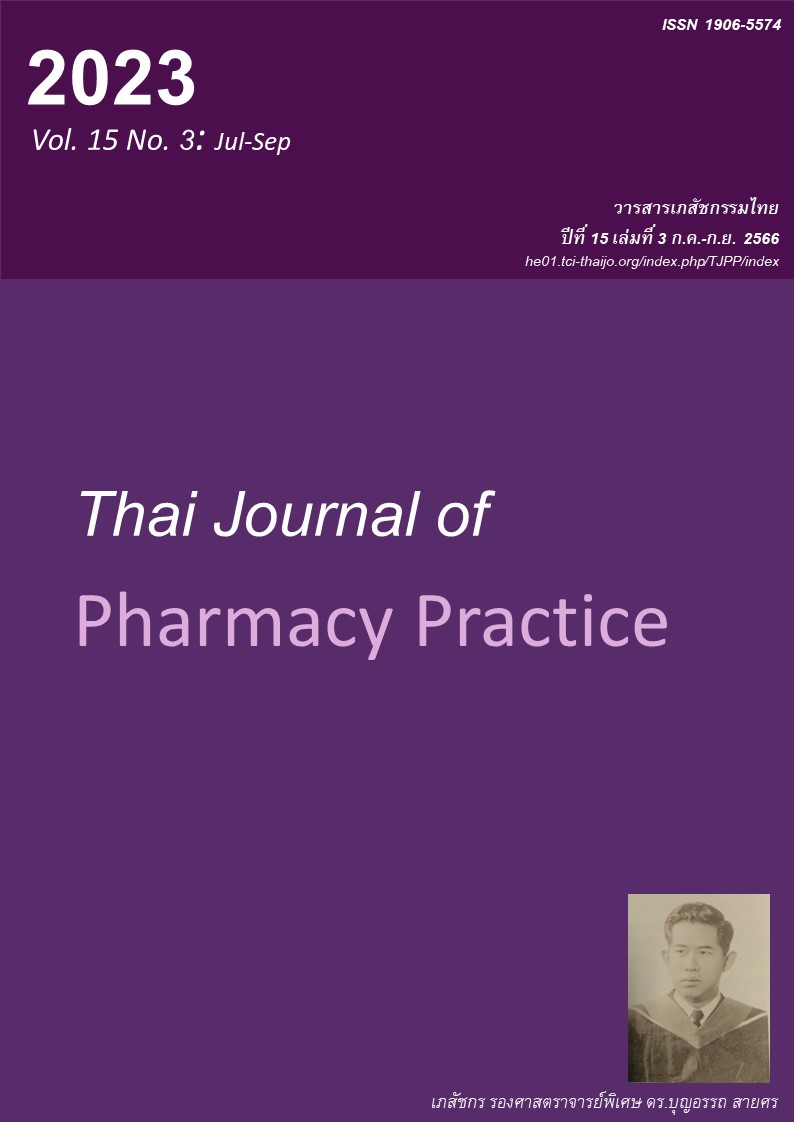ปัจจัยที่มีผลต่อความผูกพันต่อการเรียนของนักศึกษาเภสัชศาสตร์
Main Article Content
บทคัดย่อ
วัตถุประสงค์: เพื่อศึกษาระดับความผูกพันต่อการเรียน และปัจจัยที่มีผลต่อความผูกพันต่อการเรียนของนักศึกษาเภสัชศาสตร์ มหาวิทยาลัยศิลปากร วิธีการ : การศึกษาเชิงวิเคราะห์แบบภาคตัดขวางนี้ เก็บข้อมูลโดยใช้แบบสอบถามแบบออนไลน์ในนักศึกษาเภสัชศาสตร์ระดับปริญญาตรี มหาวิทยาลัยศิลปากร ชั้นปีที่ 1-6 จำนวน 1,020 คน แบบสอบถามวัดปัจจัยต่าง ๆ ได้แก่ ข้อมูลทั่วไป สุขภาพจิต การสนับสนุนจากครอบครัว เพื่อนและอาจารย์ที่ปรึกษา สิ่งอำนวยความสะดวกในการเรียน เป็นต้น ส่วนการวัดความผูกพันต่อการเรียนใช้แบบสอบถาม University Student Engagement Inventory (USEI) การศึกษานี้ใช้การวิเคราะห์องค์ประกอบเชิงสำรวจเพื่อลดจำนวนตัวแปรอิสระและลดการเกิดปัญหาความสัมพันธ์ระหว่างตัวแปรอิสระ และใช้การวิเคราะห์การถดถอยเชิงพหุคูณเพื่อหาปัจจัยที่มีผลต่อความผูกพันต่อการเรียน ผลการศึกษา: มีผู้ตอบแบบสอบถามกลับจำนวน 312 คน (ร้อยละ 30.59) โดยมีคะแนนเฉลี่ยความผูกพันต่อการเรียนของผู้เรียนเท่ากับ 57.11 ± 5.66 จากคะแนนเต็ม 75 คะแนน ปัจจัยที่มีผลต่อความผูกพันต่อการเรียนของผู้เรียนอย่างมีนัยสำคัญทางสถิติ มี 6 ปัจจัย คือ การได้รับทุนการศึกษา (P=0.014) หลักสูตร อาจารย์ และชื่อเสียงของคณะ (P<0.001) สิ่งอำนวยความสะดวกในการเรียน (P<0.001) การสนับสนุนจากครอบครัว(P<0.001) การสนับสนุนจากอาจารย์ที่ปรึกษา (P<0.001) และการสนับสนุนจากเพื่อน (P=0.001) ปัจจัยเหล่านี้สามารถอธิบายความแปรปรวนของวามผูกพันต่อการเรียนได้ร้อยละ 32.3 สรุป: ปัจจัยที่มีผลต่อการสร้างความผูกพันต่อการเรียนของผู้เรียนมีทั้งในส่วนปัจจัยส่วนบุคคล ปัจจัยทางสังคม และปัจจัยที่เกี่ยวข้องกับคณะวิชา สถาบันการศึกษาสามารถนำข้อมูลปัจจัยต่าง ๆ ไปใช้ในการวางแผนเพื่อสร้างความผูกพันต่อการเรียนของผู้เรียนต่อไป
Article Details

อนุญาตภายใต้เงื่อนไข Creative Commons Attribution-NonCommercial-NoDerivatives 4.0 International License.
ผลการวิจัยและความคิดเห็นที่ปรากฏในบทความถือเป็นความคิดเห็นและอยู่ในความรับผิดชอบของผู้นิพนธ์ มิใช่ความเห็นหรือความรับผิดชอบของกองบรรณาธิการ หรือคณะเภสัชศาสตร์ มหาวิทยาลัยสงขลานครินทร์ ทั้งนี้ไม่รวมความผิดพลาดอันเกิดจากการพิมพ์ บทความที่ได้รับการเผยแพร่โดยวารสารเภสัชกรรมไทยถือเป็นสิทธิ์ของวารสารฯ
เอกสารอ้างอิง
Abla C, Fraumeni BR. Student engagement: Evidence -based strategies to boost academic and social-emotional results. Colorado: McREL International; 2019.
Trowler V. Student engagement literature review. Heslington: Higher Education Academy; 2010.
Truta C, Parv L, Topala I. Academic engagement and intention to drop out: Levers for sustainability in higher education. Sustain 2018; 10: 4637. doi.org/ 10.3390/su10124637
Finn JD, Rock DA. Academic success among students at risk for school failure. J Appl Psychol 1997; 82: 221-34.
Lin LC, Hung IC, Kinshuk, Chen NS. The impact of student engagement on learning outcomes in a cyber-flipped course. Educ Technol Res Dev. 2019; 67: 1573-91.
Jensen E. Engaging students with poverty in mind: practical strategies for raising achievement. Alexan dria: Association for Supervision & Curriculum Deve- lopment; 2013.
Wang C. Szabo JS, Dykman RA. Effects of a carbohydrate supplement upon resting brain activity. Integr Physiol Behav Sci. 2004; 39: 126-38.
Christenson S, Reschly AL, Wylie C. Handbook of research on student engagement. New York: Sprin ger; 2012.
Cocorada E. Achievement emotions and performance among university students. Bulletin of the Transilva nia University of Brasov, Series VII: Social Sciences and Law. 2016; 9: 119-28.
Karim MI, Hamid HS. Factor structure of the student engagement instrument among Malaysian under graduates. Jurnal Psikologi Malaysia 2016; 30: 1-12.
Sagayadevan V, Jeyaraj S. The role of emotional engagement in lecturer-student interaction and the impact on academic outcomes of student achieve ment and learning. J Scholar Teach Learn 2012; 12: 1-30.
Pusapanich P, Wongpinpech V, Smithikrai C, Kreau sukon P. Factors predicting student engagement of Chiang Mai University students. Chiang Mai: Department of Psychology, Faculty of Humanities, Chiang Mai University; 2017.
Silpakorn University. Student list [online]. 2019 [cited Dec 22, 2019]. Available from: reg4.su.ac.th/regis trar/studentByProgram.asp.
Wongkongkaew P, Krongkaew A, Tachayaphong A. Cause of student drop out bachelor of accountancy program as usual attitude of regular students, Department of Accounting, Rajabhat Kampheang phet University. The 4th Kamphaengphet Rajabhat University National Conference; 2017 Dec 22; Kam phaengphet: Kamphaengphet Rajabhat University; 2017. p.731-42
Taros S. Discriminant factors of undergraduate students dropping out in Mahasarakham University [master thesis]. Mahasarakham: Mahasarakham University; 2019
Wareebor J. Dropout and persistence phenomena of undergraduate students of Burapha University by exploration, explanation and prediction [dissertation]. Chonburi: Burapha University; 2019
Chantawong K. Factors causing the college drop outs of Valaya Alongkorn Rajabhat University under the royal patronage, Sakaeo campus. Valaya Along korn Review. 2015; 5: 127-41.
Yamane T. Statistics: an introductory analysis. 3th ed. New York: Harper and Row Publications; 1973.
Department of Mental Health. Thai GHQ 12–28–30 –60 [online]. 2016 [cited Dec 22, 2019]. Available from: dmh.go.th/test/download/view.asp?id=16#.
Maroco J, Maroco AL, Campos JADB, Fredricks JA. University student’s engagement: development of the University Student Engagement Inventory (USEI). Psicol-Reflex Crit. 2016; 29: 1-12.
Appleton JJ, Christenson SL, Kim D, Reschly AL. Measuring cognitive and psychological engagement: Validation of the Student Engagement Instrument. J School Psychol. 2006; 44: 427-45.
Jayarathna LCH. Perceived social support and academic engagement. Kelaniya Journal of Manage ment. 2014; 3: 85-92.
Fernandez-Zabala A, Goni E, Camino L, Zulaika LK. Family and school context in school engagement. Eur J Psychol Educ. 2016; 9: 47-55.
Fraide A, Ganotice JR, Ronnel BK. Social influences on students’ academic engagement and science achievement. Psychol Stud 2014; 59: 30-5.


